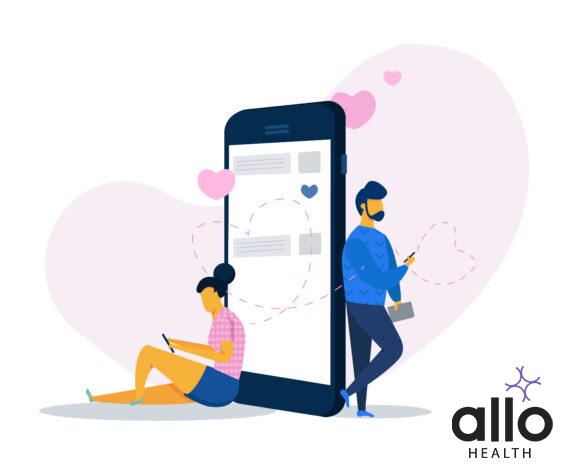The Role of Technology in Shaping Sexual Norms Across Generations

Allo Health is dedicated to personalized well-being, offering support and trusted information tailored to individual health goals. The platform emphasizes human-generated content, led by a distinguished medical team of experts, including physicians and sexual health specialists. Their commitment to credibility involves rigorous fact-checking, authoritative research, and continuous updates to ensure accurate, up-to-date information. Allo Health's unique approach goes beyond conventional platforms, providing expert-led insights and a continuous commitment to excellence, with user feedback playing a crucial role in shaping the platform's authoritative voice.

Dr Sandip completed his training in Psychiatry and sexual medicine in the UK. A post-graduate in Psychiatry from KMC Manipal, he worked in the UK for over 8 years following a one-year research post at NIMHANS, Bangalore. With an interest in the fields of sexual health and functioning, he has authored articles in books and peer-reviewed journals. A recipient of the student of the year award by BSART in 2010, he is currently a consultant psychiatrist and sexual and relationship therapist with a belief in a holistic and psychotherapeutic approach to treating psychological distress.
Why This Was Upated?
Our experts continually monitor the health and wellness space, and we update our articles when new information became available.
Updated on 15 July, 2024
- Article was updated as part of our commitment to diversity, equity, and inclusion.
"The following blog article provides general information and insights on various topics. However, it is important to note that the information presented is not intended as professional advice in any specific field or area. The content of this blog is for general educational and informational purposes only.
Book consultation
The content should not be interpreted as endorsement, recommendation, or guarantee of any product, service, or information mentioned. Readers are solely responsible for the decisions and actions they take based on the information provided in this blog. It is essential to exercise individual judgment, critical thinking, and personal responsibility when applying or implementing any information or suggestions discussed in the blog."
In today’s digital age, technology profoundly influences almost every aspect of our lives, including our sexual norms and behaviours. This article explores how digital platforms and technological advancements shape sexual norms across different generations, highlighting both the positive and negative aspects. Understanding these influences is crucial in navigating the complex interplay between technology and sexuality.
Historical Context
Before the digital revolution, sexual norms were primarily shaped by cultural, religious, and social influences, with information often passed down through personal interactions and limited media. Key technological milestones, such as the advent of the internet, the proliferation of smartphones, and the rise of social media, have drastically altered how people access and share information about sex, leading to significant shifts in sexual norms and behaviours.
Positive Aspects of Technology on Sexual Norms
Access to Information
Understanding evolving sexual norms also means understanding that technology plays a pivotal role, as evidenced by a recent study conducted between January and June 2020. This study focused on the online behaviour of emerging adults aged 18–29 in Ireland, revealing that the internet serves as a crucial resource for accessing sexual health information. The findings underscore how websites, apps, and online courses provide unparalleled access to knowledge on contraception, sexual orientation, and other critical topics.
This access empowers individuals to make informed decisions about their sexual health, filling gaps left by traditional education programs that may not fully address modern sexual behaviours and concerns among young adults. Privacy concerns and the need for user-friendly, confidential content emerged as significant themes, highlighting the importance of developing tailored online resources that meet the specific needs of this demographic.
As such, the study not only highlights the positive impact of technology on shaping sexual norms but also calls for continued advancements in online sexual health education to better support emerging adults in navigating their sexual identities and health.
Awareness and Acceptance
Digital platforms play a pivotal role in promoting acceptance and awareness of diverse sexual orientations and identities. Through social media campaigns, online communities, and educational content, these platforms contribute significantly to fostering a more inclusive understanding of sexuality. By reducing stigma and creating spaces where marginalised groups can express themselves, digital platforms help cultivate a sense of belonging.
Research by Livingstone (2008) highlights that teenagers often utilise social networking sites not only for socialising but also for seeking intimacy, maintaining privacy, and expressing their identities. These platforms serve as vital avenues for young people to explore and understand diverse sexual orientations and identities, thereby promoting greater awareness and acceptance within their peer groups and broader communities.
Digital platforms not only facilitate communication and connection but also play a crucial role in shaping attitudes towards sexuality, promoting inclusivity, and empowering individuals to embrace and celebrate their unique identities.

Sexual Empowerment
Sexual empowerment is increasingly facilitated by technology, which provides individuals with unprecedented opportunities to explore and express their sexuality safely and confidently. Dating apps, virtual reality experiences, and online forums have revolutionised how people connect and interact, offering platforms for exploration and experimentation that were previously inaccessible.
Dating apps, for example, enable users to specify their preferences and interests, facilitating connections based on mutual consent and compatibility. This allows individuals to navigate their sexual identities and desires in a controlled and respectful manner, promoting a sense of agency and autonomy.
Virtual reality (VR) experiences take exploration to a new level by offering immersive environments where individuals can engage in simulated interactions and scenarios. This technology allows users to experiment with different aspects of their sexuality in a safe and controlled setting, fostering confidence and self-discovery.
Online forums and communities provide spaces for individuals to discuss and share experiences related to sexuality openly and anonymously. These platforms not only offer support and education but also help normalise diverse sexual practices and preferences, promoting inclusivity and understanding.
Technology plays a crucial role in enhancing sexual autonomy and confidence by providing innovative tools and platforms that empower individuals to explore and express their sexuality in ways that are safe, consensual, and empowering. This evolution continues to reshape societal attitudes towards sexuality, promoting a more open and accepting culture.
Negative Aspects of Technology on Sexual Norms
Misinformation
Misinformation surrounding sexual health proliferates on the internet, posing significant risks such as encouraging risky behaviours, perpetuating misconceptions, and leading to poor health outcomes. This abundance of inaccurate information underscores the critical importance of accessing reliable sources and developing digital literacy skills.
The internet serves as a vast repository where inaccurate or outdated sexual health information can easily circulate and influence individuals’ perceptions and decisions. Misinformation may include myths about contraception, STI transmission, or sexual norms, which can contribute to misunderstandings and stigma.
According to research by the Pew Research Center (2019), the prevalence of inaccurate information on the internet highlights the necessity for users to exercise caution and discernment when seeking information. Reliable sources, such as reputable health websites, medical professionals, and evidence-based studies, are essential for obtaining accurate and up-to-date information on sexual health.
Digital literacy plays a crucial role in navigating the online landscape effectively. By honing skills in critical thinking, fact-checking, and evaluating sources, individuals can better discern credible information from misinformation. This empowers users to make informed decisions regarding their sexual health and well-being.
Addressing misinformation requires concerted efforts from both platforms and users alike to promote accurate information dissemination and combat harmful myths. By fostering a culture of digital responsibility and promoting access to reliable sources, society can mitigate the impact of misinformation on sexual health outcomes and promote a more informed and educated populace.
Cyberbullying and Harassment
Cyberbullying and online harassment represent significant challenges that can profoundly affect individuals’ sexual behaviour and mental well-being. Victims of such digital aggression often endure heightened levels of anxiety, depression, and reluctance to engage in social interactions and relationships, highlighting the detrimental impact of negative online interactions.
Cyberbullying encompasses various forms of harassment, including derogatory comments, threats, or the dissemination of personal information without consent, all of which can severely undermine victims’ self-esteem and sense of safety. These harmful behaviours not only inflict immediate emotional distress but can also have long-term consequences on individuals’ mental health and social confidence.

Research by Livingstone (2008) underscores the pervasive nature of online harassment, particularly among teenagers who are more vulnerable to its effects. Adolescents may experience heightened sensitivity to peer validation and acceptance, making them susceptible to the emotional toll of cyberbullying incidents.
The repercussions of cyberbullying extend beyond personal distress, influencing individuals’ attitudes towards intimacy and relationships. Victims may develop apprehensions about forming connections online or offline, fearing further harassment or judgement. This can contribute to social withdrawal and a diminished sense of trust in digital interactions.
Addressing cyberbullying requires concerted efforts from digital platforms, policymakers, and communities to implement robust safeguards and support mechanisms. Educating users about respectful online behaviour, promoting empathy, and providing resources for victims are essential steps towards fostering a safer and more positive digital environment.
By raising awareness about the impact of cyberbullying on sexual behaviour and self-esteem, society can work towards cultivating healthier online interactions and empowering individuals to navigate digital spaces with confidence and resilience.
Privacy Concerns
Privacy and data security are major concerns in the digital age. Sharing personal information on dating apps or social media can lead to breaches of privacy, identity theft, and exploitation, highlighting the importance of digital safety practices. Joinson (2008) explains that privacy issues are prevalent in social media, with personal data often at risk.
Pornography
The widespread availability and consumption of pornography have significant implications for sexual attitudes, expectations, and behaviours, potentially shaping individuals’ perceptions and experiences in intimate relationships. Access to explicit content through digital platforms has raised concerns about its impact on fostering healthy sexual attitudes and behaviours.
Pornography often portrays exaggerated or unrealistic sexual scenarios, which can contribute to setting unattainable standards for sexual performance, appearance, and relationships. This can lead to individuals developing distorted expectations about sexual encounters and relationships, potentially affecting their self-esteem and satisfaction.
Research by Sun, Bridges, Johnson, and Ezzell (2016) highlights that pornography consumption can influence sexual behaviours by normalising certain practices or behaviours depicted in adult films. This normalisation may lead individuals to emulate behaviours seen in pornography without considering the context, consent, or realistic expectations of intimate relationships.

The accessibility of explicit content also raises concerns about its potential impact on adolescents and young adults, who may lack the maturity or critical thinking skills to differentiate between fantasy and reality portrayed in pornography. Exposure at a young age can shape attitudes towards sex and relationships during critical developmental stages.
Addressing the influence of pornography requires a multifaceted approach that includes education, open dialogue, and promoting media literacy. Educating individuals about the differences between fantasy and reality in pornography, discussing healthy sexual relationships, and emphasising consent and respect in intimate interactions are crucial steps towards mitigating the potential negative effects of pornography consumption.
By fostering a culture of informed and responsible consumption of media content, including pornography, society can empower individuals to develop healthier attitudes towards sex and relationships, grounded in respect, consent, and realistic expectations.
